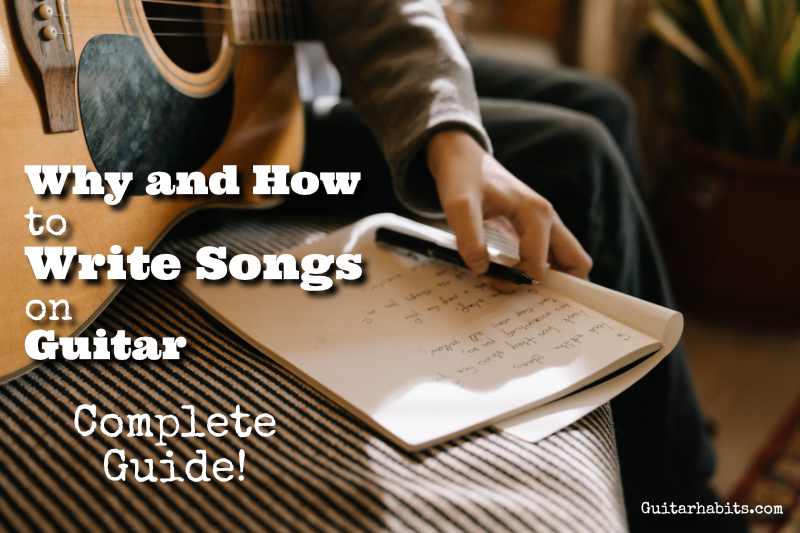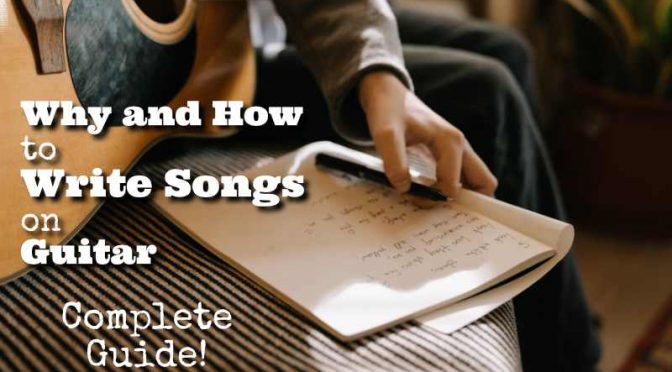GUITARHABITS
Last Updated on January 27, 2021 by Klaus Crow

Why would you want to write a song?
Songwriting is both an art and a craft where you can express your musical creativity, your heart and soul into the ultimate form of a song.
It’s a great learning process for guitar players and all musicians. You’ll discover music on so many new levels and learn to think differently on how to approach your instrument. When you write your own songs you will also learn to transcribe songs faster, and understand and play music in a more proficient way.
I’ve got a lot of guitar students who started writing their own songs and many of them were surprised with how much they enjoyed it and found they could actually write a song. Try it and you might find yourself on a new path you never expected. There is only something to win here.
How to write a song
There are many ways to approach songwriting. You can write a personal story and sing about the struggles and challenges you go through in life. The side effect is highly therapeutic. Many artists do this.
You can also write in a narrative style and bring your own concepts and characters to life through your lyrics. Think about the message you want to get across.
To learn a certain style of songwriting study the professionals. Listen and read the lyrics of your favorite artists, learn how they approach their song writing and convey their stories. Watch interviews on Youtube on their songwriting process. The same goes for the use of chords, chord progressions, melody, rhythm playing, and other musical arrangements. Study, analyze, hear and feel them.
Song Structure
For writing a song you can use different components like an intro, verse, chorus, bridge, instrumental solo and outro. These components or sections are then repeated in some way. The most common forms are:
ABAB : Verse – Chorus – Verse – Chorus
AABA: Verse – Verse – Chorus – Verse
ABABCB: Verse – Chorus – Verse – Chorus – Bridge – Chorus
Around these sections you can create an intro, a guitar solo or an outro.
Tip: Listen to your favorite song writers and figure out what song structure they use and which ones you prefer.
Hook
You can also had a hook to your song. A hook is a catchy repeating element of the song. It can be a melodic phrase, a lyrical phrase, a cool lick or riff in the song that is appealing to the listener’s ear. It’s that thing that stands out, sticks with you and keeps ringing in your head all day long after listening to a song. See if you can find a captivating and memorable component to add to your song.
Rhyming Schemes
For rhyming schemes we can also use certain formulas. Most verses and chorus are made up of four lines where these lines have to rhyme in some fashion. Here are some of the most common rhyming structures:
AABB: The first and second line rhyme, and the third and fourth line rhyme.
ABAB: The first and third line rhyme, and the second and fourth line rhyme.
AAAA: All the lines rhyme.
XAXA: The first and third line don’t have to rhyme, the second and fourth line are forming a rhyme.
AXAA: The second line doesn’t have to rhyme and the others do.
AAXA: The third line doesn’t rhyme and the first, second and fourth line rhyme.
AAAX: The first, second and third line rhyme and the fourth doesn’t.
Tip: Listen to your favorite songs and descipher their rhyming schemes.
The order of song writing
There’s no rule on how to start your song. You can start with a nice chord progression and write the lyrics and melody afterward. If you choose that approach make sure the lyrics and melody match with the sound of your chord progression.
You can also write the lyrics, chords and melody all simultaneously in the moment of creating. The third way is to write the complete lyrics first and then later add the chords and vocal melody. You can always adjust the lyrics a bit later to fit the melody and chord structure.
There are many song writers and artists who have created beautiful songs using all three methods, so don’t worry about what to choose. Experiment with different methods and see what suits you best.
Chords and Chord Progressions
If you start writing a song with a chord progression you can use popular and natural sounding chord progressions like the I – IV – V or the I – VI – IV – V that are used in many songs. This might be a good choice if you just start out writing songs. In the end the vocal melody line determines how a song differentiate itself from the other songs.
You can also experiment, which is the most fun, and let your ear decide where the chords and the chord progression are heading. What chords and vibe feel good and match with the lyrics. Be aware of the story while you’re creating the music around it.
Ask yourself in what key you want to write the song. Which key suits best with your vocal range or with the feel and mood of the song. Try your song starting with a G chord, C chord or an E chord. This is a matter of experimenting.
You can also think of writing a song in a major key, C major for example (which expresses a more happy, feel good sound) or in a minor key, Am for example (which gives a more melancholic, sorrowful or sad feel to it).
Learning curve
All good things come with practice. Song writing is a skill you need to develop like all other things. You will write shitty songs in the beginning and that’s okay. Enjoy the creative side, the learning process, and somewhere along the way you will start writing better, more confidently and good songs start to happen. Be patient.
Get out of your own way
When you get stuck during the writing of a song try to get out of your own way. You’re probably trying too hard. You might want to achieve a certain sound or melody that doesn’t present itself at that moment. Take a break for a few minutes or an hour (leave the room or go for a walk) or just go with the melody that does present itself. You are the only one who gets in the way of the flow. Get out of your own head and just let it be what it wants to be. Simplicity goes a long way.
Break the rules
Regardless of all the tips, techniques and knowledge of how to write a song there are really no rules when it comes to writing your song. You don’t have to write in a poetic way, sounding sophisticated, narrative style, or writing similar to any kind of songwriter whatsoever.
If we do that we all just sound alike. There are tons of bands and artists who broke the rules of writing and became famous because of it. Just write whatever your mind and heart wants to put out there. You want to write like the person you are, not like somebody else.
When Inspiration Strikes
Bring a notepad and voicerecorder everywhere you go and write down ideas during the day. Make a habit out of it. You can also use your phone for this. There are tons of apps to help you write down ideas (See “Writing tools” below). You might see things, people and situations down the street that give you inspiration. Once you become aware of your surroundings everything becomes an ideas for a song.
Writing Tools
Here are some tools to make the process of writing easier and more efficient. Try to use the Rhymezone as a last resort. Let your mind wander first, think about how to tell it differently, then empty your mind by stepping back from the story, go do something else for a minute, and the rhyme will usually present itself without having to look for it online.
Rhymezone.com
If you need help finding a word to rhyme just type in the word on their website and you get all the possible rhymes you need.
Powerthesaurus.org
Powerthesaurus gives you alternative words with a similar meaning for the word you have in mind. Sometimes you just need another word to describe what you want to convey.
Simplenote.com
If inspiration strikes you want to write down your lyrics, a note app is a perfect tool for this. I find Simplenote really great because it is plain and simple and you can use it as an app (Android & iOS) on your phone or log in on their website and use the notepad on your laptop/desktop. They are all synchronized.
Voice recorder and audio editor
This is my favorite go-to recorder app to record guitar ideas and vocal melodies. It’s only available for iPhone. Of course you can search “voice recorder” on Google Play and you will find similar apps.
36 Impeccable Ways to Overcome Songwriters Block
If you’re stuck or need a boost this post has 33 tips to get your songwriting rolling.
What’s Next?
Once you’ve written a song you can record it with music recording software like Garage band (Free, only for Mac), Audacity (Free, for Windows) or Reaper (for Windows, affordable and professional recording software), or you can go with recording software with a well known reputation like Logic Pro, Cubase and Ableton Live. Recording software like the above allow to create multiple audio tracks to record your guitar and voice, but also add keys, drums, bass and whatever you like to make it a complete song. It’s a great addition to songwriting and you’re moving to music production which is a whole new universe on its own.
You can also perform your song before friends and family. Enjoy the compliments but also learn from their constructive criticism. It’s part of the deal.
Find a fellow musician or start a band to play your songs with. It’s the best feeling ever!
Have a good time
The most important thing in this process is having fun. Realize you are learning a great musician skill here. Appreciate the learning curve. Step back when you need to. Don’t be too hard on yourself and let go of perfectionism. You can always edit later. All writers do.
If you have inspiration go for it, if you’re being challenged just write one or two lines a day. Whatever comes up. Consistency is key. Take small steps each day, hone your craft and you’ll learn the art of songwriting.
It’s all about having a good time from the beginning to the end of the song. Create a mindset and environment for yourself to write in a way that you enjoy every step of the process.
Start writing your song!
Read More
This article is from an external source and may contain external links not controlled by Empeda Music.

